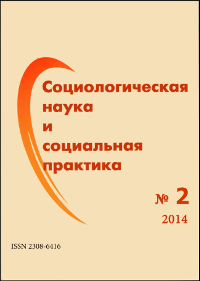Динамика культуры научного сообщества: социологические теории и практики
Аннотация
Литература
Гидденс Э. Устроение общества. М.: Академический проект, 2003. - 657 с.
Горшков М. К. Общество - социология - власть: к вопросу о взаимодействии // Социологические исследования, 2012, № 7. — С. 23-28.
Дёмина Н. В. Мертоновская концепция этоса науки: в поисках социальной геометрии норм // Этос науки. / Под ред. Киященко Л. П., Мирской Е. З. М.: Academia, 2008. — С. 144-165.
Дюркгейм Э. О разделении общественного труда. Метод социологии. М.: Наука, 1991. — 576 с.
Зиммель Г. Как возможно общество? // Теоретическая социология. Антология: в 2-х ч. / Под ред. Баньковской С. П. М.: Книжный дом «Университет», 2002. Ч. 1. — С. 314-333.
Коннов В. И. Характеристика российской научно-исследовательской культуры: возможности социально-психологического подхода // Вопросы психологии, 2012. № 4. — С. 3-12.
Конт О. Курс позитивной философии. М.: Либроком, 2012. — 296 с.
Кравченко С. А. Нелинейная социокультурная динамика: играизационный подход. М.: МГИМО-Университет, 2006. — 172 с.
Кравченко С. А. Становление сложного общества: к обо¬снованию гуманистической теории сложности. М.: МГИМО- Университет, 2012. — 306 с.
Кун Т. Структура научных революций. М.: АСТ Ермак, 2003. — 365 с.
Мангейм К. Идеология и утопия // К. Мангейм. Диагноз нашего времени. М.: Юрист, 1994. — С. 7-275.
Маркс К. Критика политической экономии // К. Маркс, Ф. Энгельс. Сочинения. Т. 46. Ч. 1. М.: Издательство политической литературы, 1968. — С. 51-508.
Маркс К. Экономико-философские рукописи // К. Маркс Социология. Сборник. М.: Канон-Пресс-Ц, 2000.
Мертон Р. Наука и демократическая социальная структура // Р. Мертон. Социальная теория и социальная структура. М.: АСТ, 2006. — С. 767-781.
Поппер К. Логика научного исследования. М.: АСТ, 2010. — 576 с.
Поппер К. Нищета историцизма. М.: Прогресс, 1993. — 188 с.
Сорокин П. Социальная и культурная динамика. СПб.: РХГИ, 2000. — 1056 с.
Спенсер Г. Грехи законодателей // СоцИс, 1992. № 2. — С. 125-136.
Урри Дж. Социология за пределами обществ. М.: Издательский дом Высшей школы экономики, 2012. — 302 с.
Ярошевский М. Г. Школы в науке // Аллахвердян А. Г., Мошкова Г. Ю., Юревич А. В., Ярошевский М. Г. Психология науки. М.: Издательство «Флинта», 1998. - С. 105-118.
Barnes, B. Interests and the Growth of Knowledge. London: Routledge and K. Paul, 1977.
Barnes, B., Shapin, S. (eds.) Natural Order: Historical Studies of Scientific Culture. London: Sage Publications, 1979.
Bloor, D. Knowledge and Social Imagery. Chicago: University of Chicago Press, 1991.
Bryant, G., Jary, D. (eds.) Anthony Giddens. Critical Assessments. London: Routledge, 1997.
Castells, M. The Rise of the Network Society. Oxford: Wiley-Blackwell, 2010.
Etzkowitz, H., Leydesdorff, L. Universities and Global Knowledge Economy. New York: Continuum, 2001.
Hofstede, G., Hofstede, G. J., Minkov, M. Cultures and Organizations: Software of the Mind. New York: McGraw-Hill, 2010.
Horgan, J. Why I Think Science is Ending [Electronic resource] // Edge URL: http://edge.org/conversation/why-i-think-science-is-ending (Accessed: 15.12.2013).
Kleinman, D., Vallas, S. Contradiction in Convergence. Universities and Industry in the Biotechnology Field // S. Frickel, K. Moore (eds.) The New Political Sociology of Science. Madison: The University of Wisconsin Press, 2006. - P. 35-62.
Knorr Cetina, K. The Scientist as an Analogical Reasoner: A Critique of the Metaphor Theory of Innovation // K. Knorr Cetina, R. Krohn, R. Whitney (eds.)
Social Process of Scientific Investigation. Dordrecht: Reidel, 1981.
Kuhn, T. Second Thoughts on Paradigms // T. Kuhn The Essential Tension. Chicago: University of Chicago Press, 1977. — P. 293-319.
Latour, B., Woolgar, S. Laboratory Life: the Construction of Scientific Facts. Princeton: Princeton University Press, 1986.
Merton, R. K. On Social Structure and Science. Chicago: University of Chicago Press, 1996.
Merton, R. K. Sociology of Science: an Epistemic Memoir. Carbondale: Southern Illinois University Press, 1979.
Merton, R. K. The Sociology of Science: Theoretical and Empirical Investigations. Chicago: University of Chicago Press, 1973.
Weber, M. The Theory of Social and Economic Organization. N.Y.: The Free Press, 1964.








 Издатель: Федеральное государственное бюджетное учреждение науки
Издатель: Федеральное государственное бюджетное учреждение науки